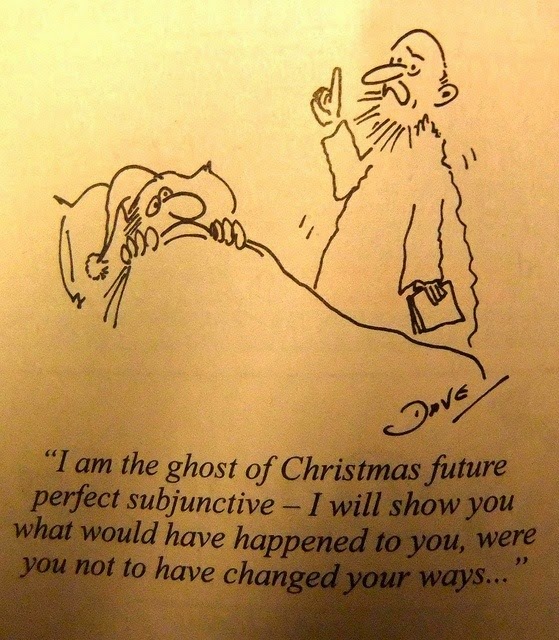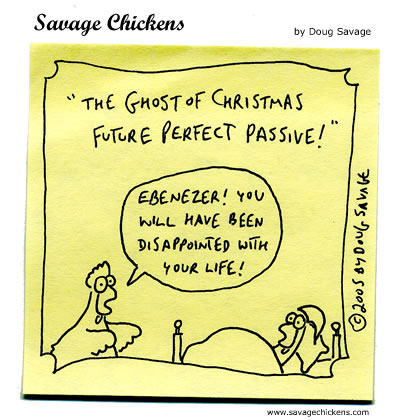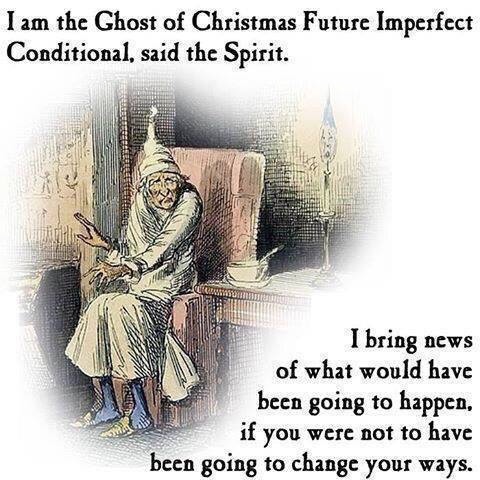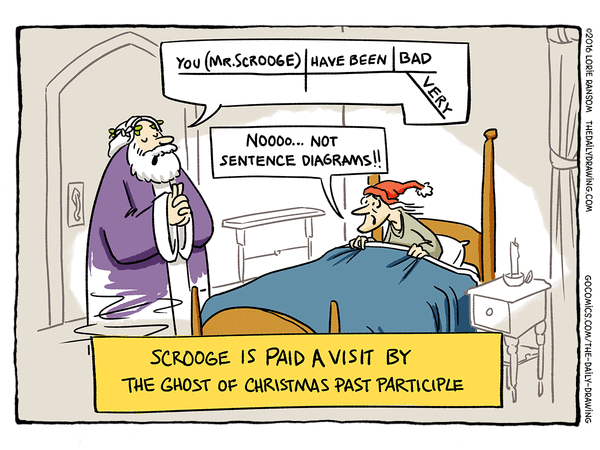The Ghost of Christmas Future Imperfect
« previous post | next post »
Fritz Ruehr sent a cartoon that he found this morning on reddit:
The spirit is willing, though the grammar is weak …
Fritz notes that this Stack Exchange post from last year treads a similar path, with a cartoon version here:

And he also points us to December 2005 Savage Chickens cartoon that features the "Ghost of Christmas Future Perfect Passive":

Update — elevated from Ben Zimmer's contribution in the comments:


The Ghost of Christmas Future Imperfect • Zhi Chinese said,
December 21, 2016 @ 1:52 pm
[…] Source: Language The Ghost of Christmas Future Imperfect […]
Guy said,
December 21, 2016 @ 2:20 pm
"Disappointed" here is an adjectival passive, not a true passive. You can see this with the "seems" test: "he seems disappointed with his life".
ardj said,
December 21, 2016 @ 3:01 pm
Quite right about the weak grammar, but the ghost's disclosure works perfectly well. Oh, I might have had "had", but no-one else seems to believe in the subjunctive any more.
Guy said,
December 21, 2016 @ 8:23 pm
@ardj
It is subjunctive (or a modal preterite, if you like), that's why it's "would" and not "will". Of course, "had been going to happen" is probably just as good, since the future time reference indicated by will/would seems redundant with the "going to". But needlessly complicated auxiliary verb structures is part of the joke.
Ralph Hickok said,
December 21, 2016 @ 9:09 pm
From "The Restaurant at the End of the Universe":
One of the major problems encountered in time travel is not that of becoming your own father or mother. There is no problem in becoming your own father or mother that a broad-minded and well-adjusted family can't cope with. There is no problem with changing the course of history—the course of history does not change because it all fits together like a jigsaw. All the important changes have happened before the things they were supposed to change and it all sorts itself out in the end.
The major problem is simply one of grammar, and the main work to consult in this matter is Dr. Dan Streetmentioner's Time Traveler's Handbook of 1001 Tense Formations. It will tell you, for instance, how to describe something that was about to happen to you in the past before you avoided it by time-jumping forward two days in order to avoid it. The event will be descibed differently according to whether you are talking about it from the standpoint of your own natural time, from a time in the further future, or a time in the further past and is futher complicated by the possibility of conducting conversations while you are actually traveling from one time to another with the intention of becoming your own mother or father.
Most readers get as far as the Future Semiconditionally Modified Subinverted Plagal Past Subjunctive Intentional before giving up; and in fact in later aditions of the book all pages beyond this point have been left blank to save on printing costs.
The Hitchhiker's Guide to the Galaxy skips lightly over this tangle of academic abstraction, pausing only to note that the term "Future Perfect" has been abandoned since it was discovered not to be.
January First-of-May said,
December 22, 2016 @ 7:09 am
I recall reading a Russian time-travel story where a character, having ran out of Russian grammar to describe their complicated plan, ends up using an English phrase along the lines of "it will have been done", and claims that English tenses must have been created for time travellers because some of them just don't make much sense in any other way.
I have also read a (low-end) Russian textbook of English grammar that covered the 11 English tenses, with examples from Lord of the Rings, and claimed that the remaining 12th tense also existed, but they were not going to cover it, because it referred to a situation that was very unlikely to ever come up outside of time travel. Sadly I cannot recall which one, exactly, said 12th tense was (though probably Future Perfect Continuous).
Cervantes said,
December 22, 2016 @ 9:26 am
Si tuviera las alas de un angel, sobres esos muros de carcel volaría.
KeithB said,
December 22, 2016 @ 9:34 am
And of course, there is Heinlein's _"All You Zombies…"_, where the protagonist is his own father and mother and gives birth to himself.
bks said,
December 22, 2016 @ 10:51 am
Mental time travel and default-mode network functional connectivity in the developing brain
http://www.pnas.org/content/109/42/16800.abstract
Jerry Friedman said,
December 22, 2016 @ 10:56 am
So what is the ghost the ghost of, if it's not "future imperfect conditional"?
Guy: How would you understand "Bivens was not bothered by Richard's assessment"? In view of "Bivens did not seem bothered by Richard's assessment." (The latter is from Sports Illustrated via COCA, which has a nummber of hits on "[seem] [past participle] by".)
philip said,
December 22, 2016 @ 12:48 pm
I once published a poem titled Past Imperfect, Future Conditional – bit as its subject was the Troubles, I think the pun was justified.
Daniel Barkalow said,
December 22, 2016 @ 6:10 pm
@Guy: You will have been disappointed with your life by Guy Smiley, who will have mumbled the part of the script you were really looking forward to.
Jenny Chu said,
December 22, 2016 @ 8:44 pm
A trending Christmas song at the moment, composed earlier this year and just released a few weeks ago, is "The Ghost of Christmas Past". The artist noticed that, oddly, Billboard has it listed as having been written in 1969 …
http://www.billboard.com/artist/5813804/elizabeth-chan/chart
Robert said,
December 23, 2016 @ 9:40 am
There's a much more apt Heinlein on this: "The Cat Who Walks Through Walls", wherein the tense of a verb in the opening, "I have a prosthetic leg," is the clue to solve the mystery of whether the 1st-person character survived at the end. I also like the time-travel word play, "Are you looped?"
Ben Zimmer said,
December 23, 2016 @ 9:52 pm
And here's another one for the collection.
Joe said,
December 25, 2016 @ 8:27 am
I think the sentence diagram is incorrect. The word, BAD, is an adjective, not a noun or noun phrase. Therefore it can't be a direct object, which the vertical line implies. The line should be angled thus: \. At least that's the way I learned to do it about 50 or so years ago.
Rodger C said,
December 25, 2016 @ 1:21 pm
Yes, the backslash is, I think, supposed to be pointing at or leaning toward the subject, indicating a complement.